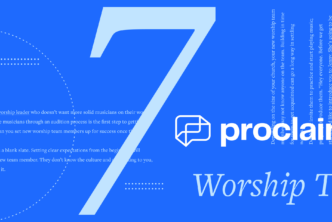“What’s your calling?”
How you answer that question could change the way you see your entire life. The answer—and the process of learning how to answer—helps us find our place within the body of Christ (1 Corinthians 12:4–30).
Every Christian is called to go and make disciples (Matthew 28:18–20), but where and how we do that looks radically different for every person.
If you don’t already know your calling, questions like that can be really uncomfortable. They pry into your unique identity as a believer and ask you to share what God is telling you about who you are.
When the answer is “I don’t know,” Christians pray, reflect on who they are, and talk to people who know them and know God. It’s important. If we try to live outside of that calling—to be a different part of the body—who we are creates friction with what we’re doing (1 Corinthians 12:14–18).
Likewise, every church—every group of believers who set out to spread the gospel together—should have a clear idea of who they are and who they’re called to reach. On Faithlife Today, Justin Wise, author of The Social Church: A Theology of Digital Communication, shared why it’s so crucial for churches to shape their ministry around their identity.
“It’s what everything builds on. It’s your strong foundation,” Justin says. “It has to extend beyond just, ‘Well, we’re a church, and we’re called to preach the gospel.'” Because so is every other church.
A group of uniquely-gifted individuals doesn’t turn into a generic church. Cookie-cutter answers aren’t really answers. It’s like when you ask what a passage is about in small group and someone says, “Jesus.”
“We believe God has called us individually to a mission, to a purpose,” Justin says. “He uses our life experiences, he uses our time in history, he uses who we are as people to reach the world around us. But the same holds true for our churches. We’ve been put in the city that we’re in. We’ve been given the people who make up our congregation for a purpose, for a reason. And so as leaders it’s our job to drill down into that and to understand what our specific calling as a church is. That’s the big idea.”
So how do you identify your unique calling as a church? Justin has a couple of great examples of what this process looks like.
“We worked with a church that had a lot of adoptive people in their church—meaning either they had adopted children themselves as a couple, or they had been adopted growing up. . . . Part of their big idea as a church is this metaphor of adoption, this thought, this pattern in Scripture that we see of adoption—being adopted into God’s family.”
Recognizing what their congregation looked like helped the church find its voice. It wasn’t a deviation from their calling to preach the gospel—it revealed which pieces of the gospel connect most deeply with the people they serve.
“I spoke to a pastor in Hawaii,” Justin says, “and he ran a church called The Surfers Church. . . . They had church on the beach. Part of their big idea was that this pastor was a surfer, and so he wanted to reach other surfers and bring that light and life of Jesus into that church, and so they just had church on the beach.”
They identified who they wanted to reach, and they started preaching the gospel where those people are.
Each of these churches defined a specific mission, and what their ministry looked like developed out of that mission. Justin says these people “had taken the time and the effort to drill down and understand who God had called them to be as a church, and then wrapped their big idea around it.”
Before your church ever sets out to use social media, email, or a church website as a ministry tool, you have to answer one question:
“What’s your calling?”





